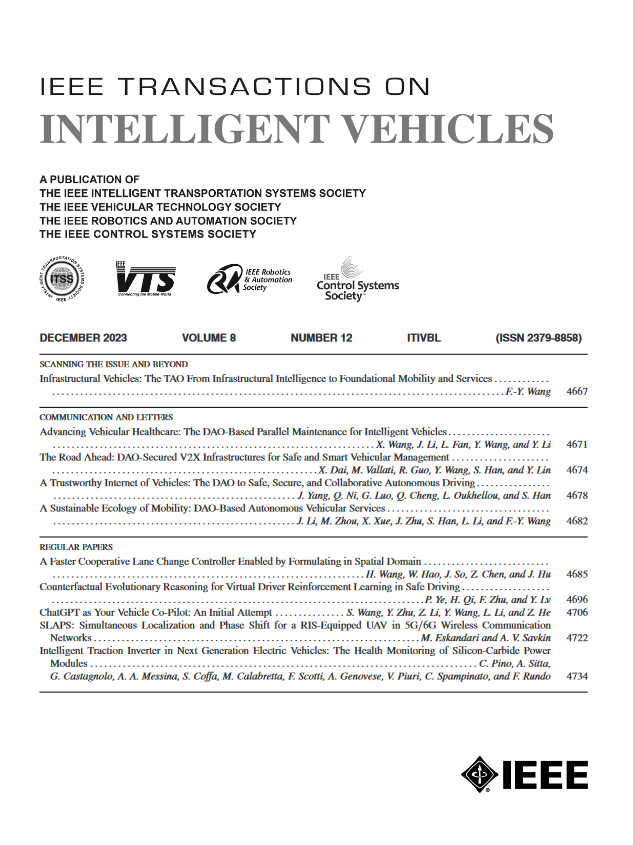基于深度信道先验的无监督特征增强模块增强现实世界退化中的视觉识别
IF 14
1区 工程技术
Q1 COMPUTER SCIENCE, ARTIFICIAL INTELLIGENCE
引用次数: 0
摘要
在过去十年中,自动驾驶汽车在正常条件下的环境感知取得了相当大的成功。然而,雾、弱光、运动模糊等各种不利条件会降低图像质量,对自动驾驶的安全性构成巨大威胁。也就是说,当应用于退化图像时,由于捕获图像的统计和结构属性中断导致的特征内容丢失和人工干扰,最先进的视觉模型通常会遭受性能下降。为了解决这个问题,本工作提出了一种新的深度通道先验(DCP)用于退化的视觉识别。具体而言,我们观察到,在预训练模型的深度表征空间中,具有相同退化类型的退化特征即使具有不同的内容和语义,其通道相关性也具有均匀分布,这有助于在高稀疏特征空间中学习退化表征与清晰表征之间的映射关系。在此基础上,提出了一种新型即插即用无监督特征增强模块(UFEM)来实现无监督特征校正,在UFEM的第一阶段引入多对抗机制,实现高稀疏特征空间中潜在内容的恢复和伪像的去除。然后,将生成的特征转移到第二阶段,在DCP的指导下进行全局相关调制,以获得高质量且易于识别的特征。对三个任务和八个基准数据集的评估表明,我们提出的方法可以全面提高预训练模型在真实退化条件下的性能。本文章由计算机程序翻译,如有差异,请以英文原文为准。
Boosting Visual Recognition in Real-World Degradations via Unsupervised Feature Enhancement Module With Deep Channel Prior
The environmental perception of autonomous vehicles in normal conditions have achieved considerable success in the past decade. However, various unfavourable conditions such as fog, low-light, and motion blur will degrade image quality and pose tremendous threats to the safety of autonomous driving. That is, when applied to degraded images, state-of-the-art visual models often suffer performance decline due to the feature content loss and artifact interference caused by statistical and structural properties disruption of captured images. To address this problem, this work proposes a novel Deep Channel Prior (DCP) for degraded visual recognition. Specifically, we observe that, in the deep representation space of pre-trained models, the channel correlations of degraded features with the same degradation type have uniform distribution even if they have different content and semantics, which can facilitate the mapping relationship learning between degraded and clear representations in high-sparsity feature space. Based on this, a novel plug-and-play Unsupervised Feature Enhancement Module (UFEM) is proposed to achieve unsupervised feature correction, where the multi-adversarial mechanism is introduced in the first stage of UFEM to achieve the latent content restoration and artifact removal in high-sparsity feature space. Then, the generated features are transferred to the second stage for global correlation modulation under the guidance of DCP to obtain high-quality and recognition-friendly features. Evaluations of three tasks and eight benchmark datasets demonstrate that our proposed method can comprehensively improve the performance of pre-trained models in real degradation conditions.
求助全文
通过发布文献求助,成功后即可免费获取论文全文。
去求助
来源期刊

IEEE Transactions on Intelligent Vehicles
Mathematics-Control and Optimization
CiteScore
12.10
自引率
13.40%
发文量
177
期刊介绍:
The IEEE Transactions on Intelligent Vehicles (T-IV) is a premier platform for publishing peer-reviewed articles that present innovative research concepts, application results, significant theoretical findings, and application case studies in the field of intelligent vehicles. With a particular emphasis on automated vehicles within roadway environments, T-IV aims to raise awareness of pressing research and application challenges.
Our focus is on providing critical information to the intelligent vehicle community, serving as a dissemination vehicle for IEEE ITS Society members and others interested in learning about the state-of-the-art developments and progress in research and applications related to intelligent vehicles. Join us in advancing knowledge and innovation in this dynamic field.
 求助内容:
求助内容: 应助结果提醒方式:
应助结果提醒方式:


